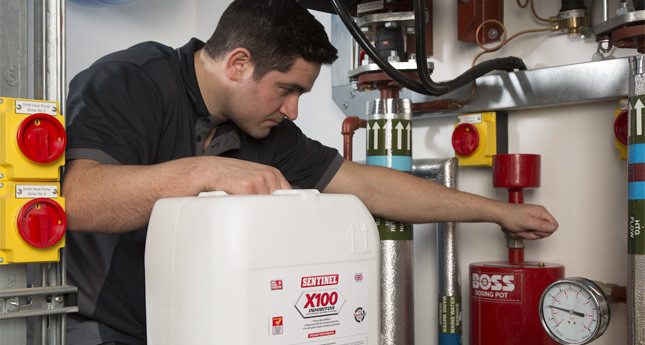

Water treatment specialist, Sentinel Commercial, is urging building maintenance engineers to take advantage of planned shutdown periods to review water quality in boiler plants and implement any necessary chemical treatments, such as system cleaning and inhibitor dosing.
These procedures, which can take several days or more to complete depending on the size and complexity of a system, are vital to the health of boilers and heating systems as a whole. Those which do not receive adequate water treatment are likely to suffer from excess energy consumption, poor heat transfer, premature repairs and parts replacements, and breakdowns.
Chris Shelton, Sales Director of Sentinel Commercial, said: “Often, insufficient time is allocated for proper water treatment, and this can leave commercial heating systems vulnerable to a range of very serious and costly problems, including complete boiler failure and unexpected downtime.
“Planned shutdowns – such as during school holidays or for general refurbishments - represent the ideal opportunity for engineers to undertake programmes of best practice water treatment, thereby ensuring maximum protection and energy efficiency of those heating systems,”
Best practice water treatment, which comprises system cleaning, protection and maintenance, is able to deliver lifetime protection to boilers and heating system components through the prevention of corrosion or Limescale build-up.
The benefits of best practice water treatment include optimal energy savings, heat transfer, and system longevity and performance, and meeting boiler warranty terms and conditions. Best practice water treatment is essential for both new and existing heating systems.
Chris also said: “Planned preventative maintenance is extremely important in the commercial sector, helping to limit downtime and maintain business continuity. By regularly checking system water, engineers can catch potential problems early and take the time to consult water treatment specialists on the best courses of action – which could be carried out during planned shutdowns. Ultimately, this approach helps to achieve lifetime system protection and optimal energy savings,”
If you'd like to keep up-to-date with the latest developments in the heating and plumbing industry, why not subscribe to our weekly newsletters? Just click the button below and you can ensure all the latest industry news and new product information lands in your inbox every week.